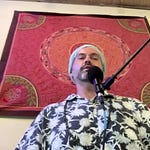Living Between Worlds: The Oxymoron of the Spiritual Householder
Every day, we wake up caught in the contradiction—torn between the pull of the infinite and the weight of the ordinary. We meditate in the early hours, touching the vast silence, only to step back into the noise of emails, deadlines, bills. We cultivate stillness in the morning and navigate chaos by noon. How do we reconcile these two worlds? The spiritual path calls us toward transcendence, yet life demands engagement. We are seekers of the unseen, yet we must function within the visible. We long to dissolve into the great mystery, yet we must keep track of rent, groceries, and responsibilities.
This is the paradox of the householder yogi, the one who does not retreat from the world but instead learns to hold its contradictions—to exist as both infinite consciousness and a being bound by time. But what if this paradox is not an obstacle but a transmission in itself? What if, instead of resisting the tension, we allow it to shape us, to transform us into the bridge between two realities?
We see this same contradiction in the UFO phenomenon—a vision of something both present and absent, real and unreal, physical and immaterial. Just as the yogi exists between two states of being, so too does the UFO exist between two definitions of reality. And just as the seeker must find a way to be both human and divine, the UFO challenges us to expand our perception, to accept that contradiction is not a failure of understanding but a pathway to a new way of knowing.
The following post dives deep into this oxymoron of existence, not to solve it, but to inhabit it fully. To live within the contradiction. To let it become the very force that drives our awakening.
What if the UFO phenomenon is not an anomaly to be explained but a paradox to be entered?
Bertrand Méheust suggests that the oxymoron is the foundation of Greek contemplation—the paradox at the heart of thought itself. The UFO phenomenon, he argues, is one such oxymoron: real yet unreal, material yet immaterial, seen yet unseen.
We might think that philosophy is meant to resolve these contradictions.
But what if, instead of trying to solve them, we inhabit them?
What if the oxymoron is not a riddle to be unraveled but a state of being, a gateway to a different kind of knowing?
If you’d like to continue reading and enjoy the full class replay, join as a paid subscriber:
Listen to this episode with a 7-day free trial
Subscribe to UBU: The Art of Being You to listen to this post and get 7 days of free access to the full post archives.










